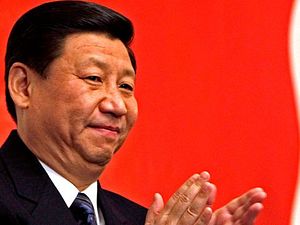The highlight of China’s 2016 political calendar, the Sixth Plenum of the 18th Party Congress of the Chinese Communist Party, kicked off on Monday, with hundreds of Communist Party leaders gathered in Beijing’s Jingxi Hotel for four days of closed-door talks.
According to Xinhua earlier this year, China’s state news agency, this year’s plenum will concentrate primarily on “key issues concerning the comprehensive and strict management of the Party,” which is another way of saying party discipline and, more specifically, the future of Chinese President Xi Jinping’s signature anti-corruption campaign.
Chinese plenums are famously secretive closed-door affairs. Top party officials meet and deliberate for four days, after which a communique is disseminated via state media outlining the major outcomes.
Last year, the Fifth Plenum led to the release of the 13th Five-Year Plan (listen to my podcast on that with Shannon Tiezzi last year) and also included the widely discussed loosening of China’s One Child Policy. The Fourth Plenum in 2014 focused on the rule of law under the Party.
Finally, as I’d discussed back in 2013, the Third Plenum of the 18th Party Congress focused primarily on economic policy. Next year, we’ll get a Seventh Plenum to set in place the final touches for the change over into China’s 19th Party Congress, which will mark the start of Xi’s second term and introduce important leadership changes in China.
Given the highly secretive nature of this week’s deliberations, it’s hard to say what exactly will emerge in the communique released at the end of the week.
In many ways, more so than the previous plenums in the 18th Party Congress, the Sixth Plenum can be broadly seen as “Xi’s Plenum,” given its focus on party loyalty and anti-corruption, the hallmarks of the Chinese president’s domestic power consolidation approach.
Particularly with the 19th Party Congress’ First Plenum a year away, Xi will be looking to set the groundwork for the impending reshuffle of the Politburo Standing Committee, where five of seven current members are expected to stand down.
Interestingly, Xinhua’s suggestion of the Sixth Plenum’s agenda noted a particular focus on intra-Party leadership and supervision.
Specifically, Xinhua noted that the “plenum in Beijing will include … writing the norms of intra-Party political life,” suggesting that Xi could spearhead a re-imagination of how the Party makes decisions internally at the highest levels.
In this context, rumors that Xi is looking to potentially delay appointing a successor, extending his own term, loom large.
Though we likely will have to wait until the 19th Party Congress for any clarity on how and where the personalization of power under Xi is headed, this week’s Plenum could offer some clues.
Another area to watch for outcomes is the relationship between the top party leadership and the People’s Liberation Army. After last year’s announcement of major restructuring and reform to the PLA, there are rumors of unease between the powerful Central Military Commission and PLA commanders. (Protests by PLA veterans earlier this month in Beijing attracted additional attention to these difficulties.)
A statement released in July after a meeting of the Political Bureau of the CPC Central Committee noted: “Intra-Party supervision is the basic and primary form of supervision, and only by pushing forward other forms of supervision alongside intra-Party supervision can we guarantee the comprehensive and strict management of the Party.”
The Sixth Plenum seems to be all about internal party procedures and ideological soul searching. We’ll know the outcomes soon enough, but it’s clear that there likely won’t be any big announcements on economic or social policy like the preceding Plenums in this Party Congress.
































